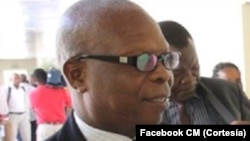Last week's brazen killing of a senior opposition negotiator, Jeremias Pondeca, dealt a blow to Mozambique’s already troubled peace talks, further postponing the oft-delayed closed-door talks that are aimed at finding a path to peace in this Southern African nation.
For more than a year, Mozambique’s ruling party and opposition have been engaged in stop-and-start peace talks that have, so far, produced no solution.
The two sides were enemies during Mozambique’s brutal, 15-year civil war. After that conflict ended in 1992, the Renamo rebel group turned political opposition and contested every national election, losing them all and crying foul every time as the ruling Frelimo party again swept to power.
A fractious 2014 election sparked fresh turmoil, with Renamo’s leader renewing conflict in his strongholds. The talks were supposed to finally find a solution and address Renamo’s demands for greater role in politics, government and administration.
And so, when opposition negotiator Pondeca was shot dead in broad daylight on a Maputo beach by unknown assailants, Mozambican analysts were quick to label it a political hit, and observers feared for the worst.
The European Union issued a statement condemning the killing, and Human Rights Watch warned that Pondeca’s death could put the peace talks at risk. The talks, which were supposed to resume this week, were delayed.
Peace talks
But then both sides did something unexpected: shaken by events, these bitter opponents did not walk away from the table.
Renamo leader Afonso Dhlakama, who has long accused Frelimo of causing the country's troubles, even appeared to soften -- although he accused Frelimo of orchestrating Pondeca’s death.
“We cannot abandon negotiations,” he said in an exclusive interview with VOA's Portuguese service. Dhlakama said that Pondeca’s death is a “tragedy but Renamo will not back down. We will continue to fight for democracy. We will work to make the regime reform and make sure that there is a functioning democracy, a state of law.”
President Filipe Nyusi appeared to similarly soften, condemning the killing and attending Pondeca’s funeral. Some observers saw that as a rare and significant reach across the aisle from the ruling party.
“It looks like, despite the very worrisome nature of this acts, both sides decided to step up to the plate and make sure it won’t derail the negotiations process, which is very encouraging,” said Miguel de Brito, who is Mozambique country director of the Electoral Institute for Sustainable Democracy in Africa.
Maputo-based lawyer and analyst Rodrigo Rocha echoed that optimism. “This is in fact one of the most positive news that we have received in the previous times,” he said.
But rights defenders say they remain concerned, as Pondeca’s name is the latest on a growing list of killings in Mozambique that are believed to be politically motivated.
Politically-motivated killings
Zenaida Machado of Human Rights Watch told VOA that since March 2015, at least 10 high-profile figures have been killed from both sides. Among them are Pondeca and another member of the Council of State, a group that advises the president.
“The numbers are bigger than that,” Machado added. “The killings include people who are not affiliated with any party but at one point have criticized the government or made political comments,” she said.
But negotiations are, at their root, still a battle for dominance and spoils. Does Renamo’s tragic loss give it an edge? De Brito isn’t sure -- and in fact thinks the government’s magnanimity may help them just as much.
“It does not give Renamo an upper hand, but it changed a little bit a public attitude of the government side in the negotiation. In the public eye, it has probably changed the perception of how these things work.”
The public will be watching, he said, as talks resume Monday.
André Baptista contributed to this report.





